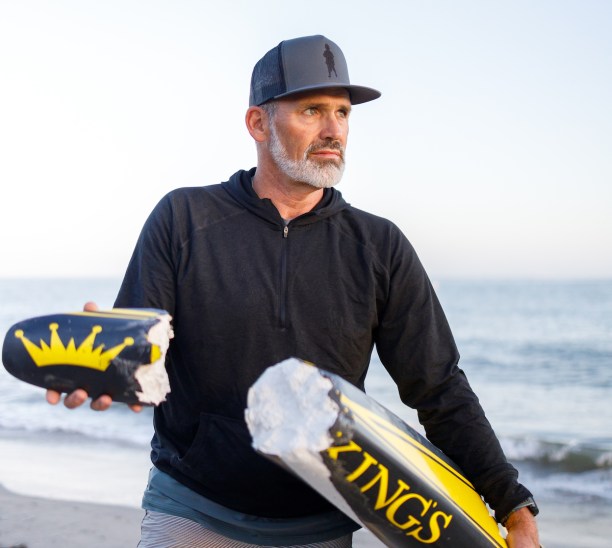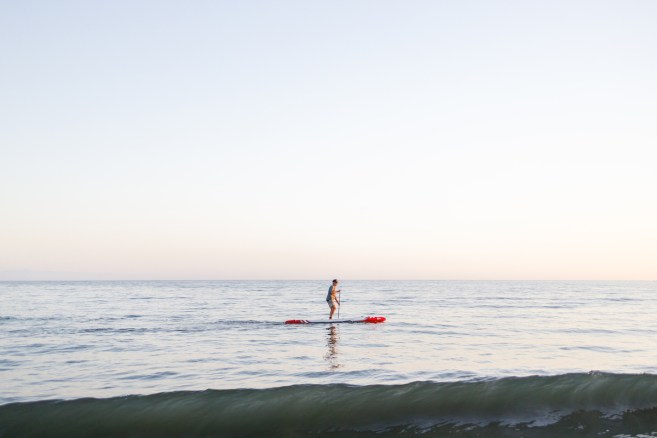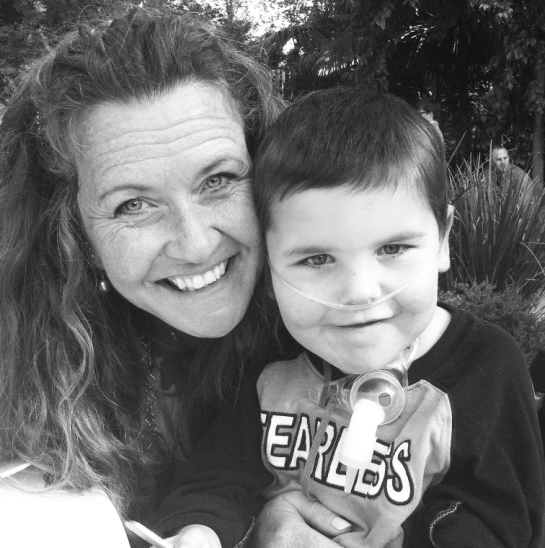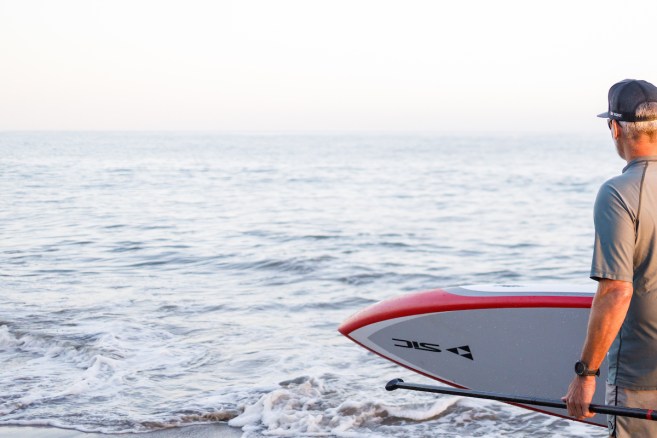Paddling to Survive
How a Santa Barbara Man Emerged From a
Shark Attack and Personal Loss In One Piece
By Rolf Geyling | October 27, 2022

“Have you ever seen any sharks?”
I’ve only lied a few times. I can usually deflect the question or give a truthfully vague response, but sometimes only a lie can save me — and spare the asker an answer that’s probably more than they bargained for.
It’s a reasonable question, as I’m known as the guy who steps on his paddleboard and disappears out into the Pacific most mornings. My story may not be the well-kept secret I think it is, but enough time has passed — which has allowed me to sort through all that life threw at me in a confounding sequence — that I’m going public: I was attacked by a shark. Not an accidental bump or nudge, but a direct strike with open jaws, froth, and fury.
Before getting to that, I need to share why I’m hooked on the ocean. It started more than 10 years ago as I was searching for something to help fend off the “dad bod’’ that was taking hold as I moved through my forties. Having recently moved to Santa Barbara, I figured I should take advantage of the ocean and bought a big, clunky stand-up paddleboard on Craigslist. As humbling as my first outings were, I stuck with it and over time developed a full-blown obsession: paddling every morning, daydreaming about the next outing, building racks in my garage to accommodate the growing flotilla of water toys, only to eventually build more in the yard.
While logging 1,000 miles a year got me into better shape than I ever imagined, what happened for me mentally and spiritually out on the ocean became even more essential. Shortly after my wife, Trish, and I arrived with our three kids in 2007, we were surprised to discover a fourth child was on the way. An even bigger surprise was learning that little Rudy would be born with hypoplastic left heart syndrome, an uncorrectable heart defect that, even with extensive interventions, would likely prevent him from reaching adulthood.
Our family learned that the journey with a medically fragile child is one of unimaginable goodness and beauty, but also a wearying ritual of round-the-clock care, weekly doctor visits, countless hours in hospitals, and days interrupted by unplanned rushes to the ER. Rudy spent the first eight months of his life in the ICU. It was a mystery to many how he ever got out of the hospital, let alone survived one year to the next while exuding incredible joy, love, and wonder. We learned to live with an underlying tension — being vigilant about Rudy’s medical needs while diving into school, work, and the life of an active family. Because any day could suddenly go sideways, we discovered that we were pretty good at operating in crisis, but in the meantime we loved Rudy and celebrated every year when another birthday came around.
Vocationally, I lead the Santa Barbara Rescue Mission, an organization serving the homeless and addicted. Among the 200 people under our roof every night, I see miracles and heroism but it’s against a backdrop of heartbreak, struggle, and unspeakable trauma. There are continual challenges to raise funds, critical issues to address, and finite resources to stretch amid a stream of never-ending needs.
As a person of faith, I believe that the fate of my family and those I serve lies in hands greater than my own, but I’ve had more than my share of sleepless nights. There are things I can’t stop worrying about, but I need some breaks and some meaningful way of getting space and distance. The most effective means I’ve discovered is to grab a paddle and point a board offshore.
To be on the ocean is to feel powerful and incredibly insignificant at the same time. You get a taste by paddling along the water’s edge, but only fully enter it when you’re far enough out to disconnect from land. You can’t make out cars and people anymore. You are invisible to them, an indiscernible speck on an overwhelming expanse of water. The open ocean moves differently than the shallows near shore. The swells lift you on massive sheets of water and lower you into deep troughs.
Every morning, I cross a boundary where time and distance separate me from all that’s happening on land. I’m alone. The only person on the planet. No one will stumble in to interrupt this moment. I’m the only person seeing it, feeling it.
Paddling the open ocean involves problem-solving: observing subtle changes, knowing when a situation is turning from acceptably risky to potentially dangerous, recognizing what the elements in play will allow, and then focusing your effort for long stretches while trying to keep your heart rate and occasional panic in check.
Hours on the water have offered me moments of deep wonder from a vantage point few enjoy: spectacular sunrises, thousands of baitfish parting like a curtain, a mysterious kelp forest disappearing into unseen depths below, an escort of curious dolphins, or the shockwave of breath exploding out of a whale’s blowhole.
These experiences of awe are what make paddling out so necessary. I’m not escaping anything, but disengaging enough to get some perspective. There are occasionally times where insights and solutions to problems hit me, but more often it’s in the experience of solitude that a reorientation takes place. I’m reminded that I’m small — so very small — and powerless amid the immense forces surrounding me.
My anguish often lies in how much is outside of my control, but that’s life. I can’t control the ocean. I can’t fix Rudy’s heart. I can’t undo the traumas that bring people to my doorstep. To live is to navigate through that which I cannot control with the faith that the One in control will sustain me. Being on the ocean each morning brings awareness, and more importantly, healthy acceptance, of just how limited I am and how infinite God is.
That Morning

On July 20, 2017, I got up well before dawn. We were a couple days away from leaving on a two-week road trip to see family in Kansas, so I wanted to get in as many long paddles as I could before being landlocked. I sped through the usual routine of giving Rudy breakfast and about a dozen meds through his feeding tube, kissed all the members of my still-sleeping family, and stole out of the house with the paddle gear and office clothes I had staged the night before.
As I pulled into Goleta Beach, I could see the lights at the end of the pier reflecting off the water’s surface in an almost perfect mirror image. A placid ocean was going to allow for a magical morning. No problems to solve or tactical navigation required, just dig the paddle deep and go.
Going out along the east side of the pier, I set my heading southeast toward the four oil platforms off Carpinteria. The low sun behind them forced me to squint and focus on the nose of my board slicing into the water while I fell into a steady cadence.
When I turned around about 1½ miles off of Hope Ranch, I could just make out the light blue tower of the boat hoist back on the pier. The gentle breeze that had been cooling my face was now pushing me along. My eyes welcomed the relief from the glare as I noticed bat rays gliding below — some solitary, some in V formations, some just feet from the surface. I can’t remember how long I watched this show. It’s what happened next that I’ll never forget.
A bomb went off under my board.
That’s the best way I can describe it. An explosive impact that snapped my head back and sent all 225 pounds of me flying into the air.
So many thoughts flew through my mind in the startled second I had in the water: shock, disbelief, confusion, fear, certainty, vulnerability, a lightning-fast inventory of hopeful possibilities (Rock? Dolphin? Seal? Whale?). But I knew exactly what it was. I had never encountered a shark before, but none of the creatures I knew behaved like this. There was a moment of aching loneliness as I watched the board skid away from me.
Foam churned up and water surged against my legs just before a white underside arced out in front of my face. I screamed and raised the paddle to strike, but before my reflexes could fire, there was a slap of the tail and the shark rocketed off to my right.
Instinctively, I snapped the leash on my leg to bring the board back. No sooner had I grabbed it, a second crack brought it surging toward me as the shark struck again on the opposite rail. I extended my arms to create distance while the board and I were pushed back by the charge. I kicked furiously to keep my head above water as its flaring nostrils came toward me and its teeth sank into the deck. I gripped the rail with everything I had as the thrashing torso tried to pull the board from me, and then suddenly it released, spun to the right, and shot out of view.
The instant I had the board back, I popped up onto my knees. I looked down into the water and found it completely empty. The shark had disappeared just as quickly as it had come. I remained alert for just a few more seconds, but had a sense that it was over. It wasn’t coming back. The board stopped rocking and the calm was already setting back on the water. I dropped my head and emptied my lungs with a primal yell. Then it was quiet again. Very quiet. I put my hands on my knees and kept my head down as I waited for things to stop spinning and my breath to return.
Saltwater, sweat, glare, and sunscreen stung my eyes behind my fogged sunglasses. I noticed something bobbing in the water off to my left. It took a moment to make sense of the odd conical shape pitching back and forth until I realized it was the tip of my board. I looked up the centerline and the smooth rails were cut short by a sawtooth serration. I started to make sense of that first explosive crack still ringing in my ears. That was supposed to be the deathblow.
It took about thirty minutes to paddle back, partly because of the board not having a nose, but also because of scattered impulses that popped through my head: Should I call 9-1-1? … I’m not hurt … I’d be back at the beach by the time they launch … Did this really happen?
Somewhere along the way I called Trish and she, my son Wilson, and Ranger Brian met me on the beach. We hustled the board up to my truck, where Brian blocked things off for privacy while he took his report. That’s not to say I went completely under the radar — it wasn’t too hard for several of the morning regulars to put together the landing party, my nose-less board, and the warning signs that got posted on the beach shortly thereafter.
Although I asked to remain anonymous, a report had to be published. Our town isn’t that big, and several people wouldn’t require many guesses to figure out who the “lone paddler off Goleta before 8 a.m.” would be. I had just gotten to my office when the first inquiring texts arrived. As it turns out, a kayaker got attacked just a few hours later down in Santa Barbara, and he made the national news. My little encounter got tacked on as a single sentence at the end of the wire story, and by the end of the day, I had gotten messages from around the country from people who know my habits.
The Storm After the Storm

It felt like our trip to Kansas was coming at a good time. A couple weeks away from the ocean might do me some good, help me make sense of what just happened, and figure out if the ocean could still be my happy place.
But then life got incredibly scary.
Rudy died. Totally out of the blue on our drive to Kansas. No warning. Within minutes he went from giddily splashing around in the hotel bathtub to unresponsive. We rushed him to a small-town ER but there was nothing that could be done. That crummy little heart just ran out of beats. Instead of strapping the excited kid into the car for the final drive to Grandma’s house, we loaded his body into a hearse and then stumbled our way back to California to plan a funeral.
As schooled as we were in Rudy’s prognosis, there was no way to prepare for losing him. Being with Rudy was a deep dive into indescribable love and beauty and having it ripped away was gutting. My head spun. Sleep and cogent thinking were scarce. Life was a fog, and I could only focus on the few things that seemed to emerge out of the blur with some sense of urgency.
Among these were some physical symptoms Trish could no longer ignore: tingling in her extremities, challenges walking, and occasional slurred speech. Six weeks after Rudy’s death, she was diagnosed with ALS. We were already seeing the start of a deterioration process that she wouldn’t survive.
There is no sugar-coating ALS, and nowhere was this more evident than in the way it attacked someone as dynamic and unforgettable as Trish. She was elegant, charming, caring, sang like an angel, and had the deepest blue eyes that sparkled when she laughed. An impossible number of people considered her their “best friend” thanks to her incredible ability to connect and love deeply.
As courageously as Trish faced her illness, and as much as we embraced good things in life and celebrated the time we had together, it became a succession of gut-punches as one body part after another lost movement and one ability after another got diminished before disappearing completely. In two short years, the disease progressed to the final act of shutting down her lungs, having rendered every last muscle in her body useless and having robbed her of every stitch of the beauty and femininity she radiated.
And amid all of this, I needed to keep functioning. I was staggered by life, but I needed to find my way through it. My family needed me. People at work depended on me. As much as I wanted to curl up in a ball, I had to figure out a way to sustain myself and keep a modicum of sanity.
Returning to the Water

There isn’t codified post-traumatic therapy for shark attacks in light of how rare they are. Not that it would even matter in my case. Somehow, “getting attacked by a shark” had gotten knocked down to third on the list of life-altering traumas I needed to work through. As there was no way to pause life, my objective became to try and function as healthily as I could. When I got stuck, I adopted a practice of asking myself what a healthy person would do and then giving that my best shot.
A healthy person would be out on the ocean — or at least a healthy me would. I stayed off the water for more than a month while sleep deprivation was making it dangerous to drive, let alone paddle. Even when the initial shock wore off, I didn’t really feel like paddling, but then again, there were many days when I didn’t really feel like breathing. A few concerned friends suggested that I go out for a couple of trips just to see how it felt. Maybe I could stay close to shore and not go out so deep.
I guess that was an option, but I quickly realized I couldn’t hug the coast. Even on my first morning back, the memory of the attack diminished as my board punched through the first crest. The urge came to dig deep and slide up the next wave … and the next … and the one after that. Every stroke brought separation from land and all that lay back there. Getting through the shallow chop fed the hunger for the bigger, slower troughs of the open ocean and, soon enough, I was back on my way to disappearing.
I don’t want to come off as fearless. It’s not like I haven’t thought about the shark. Early on, I spent lots of time looking down into the water, and a submerged strand of kelp can still occasionally give me a start. But that’s rare, and I am recapturing the joy and wonder. Space and solitude on the ocean allow emotions to come to the surface. Some days, I paddle with tears streaming down my face. I groan, not because I’m physically straining, but because life feels like it’s crushing me. And I scream without anyone hearing me as I hurl anguish out into the ether.
Other days, I am completely quiet, lying down on the board so I can feel even the slightest ripple while I lose track of time. I don’t solve any of my problems or make much more sense of life, but somehow I get enough separation to keep me sane and through another day or two. I’ll take it.
It gives some people pause to know that I’m back out on the water. A few of the morning regulars down at the park warmly question my sanity as they see me heading out. I get it. It was incredibly scary — but also so incredibly rare.
Obviously, the risk of shark attacks can be completely prevented by not going out on the ocean. I only wish there was a similar way to eliminate the other tragedies we face. Rudy died five years ago. The pain might be different, but it is still very much there. Trish has been gone for three years, but the steady progression of heartbreaks is still so vivid and raw that I don’t fully trust that it’s ended. So many things that would be devastating blows on their own have come in such a succession that it’s made me numb. I’ve dropped my gloves and just let the volleys land.
As much as I’d like the bromide that “time heals all wounds” to be true, it’s probably more likely that over time, I’m figuring out how to limp on with the wounds I have. While most wouldn’t consider me a downbeat person, I have abandoned any assumptions that life should be good or beautiful, because I have no say in that. It feels more honest to say that life is brutal and infinitely creative in coming up with ways to crush me. So I thank God when I come across beauty — and I go out of my way in search of it — trusting that this will sustain me and help me find a way through. While I wish the venue for this were danger-free, the risks of not paddling could be far more costly to me and those I love.
So I’m sorry if I lied or dodged your question. I’ve definitely seen a shark. I’ve felt fury enough to never stick my toe in the water again. But there’s a greater impulse that drives me out to the horizon every morning. However scary the ocean might be, it’s my best means of navigating the terrors of life on land.




You must be logged in to post a comment.